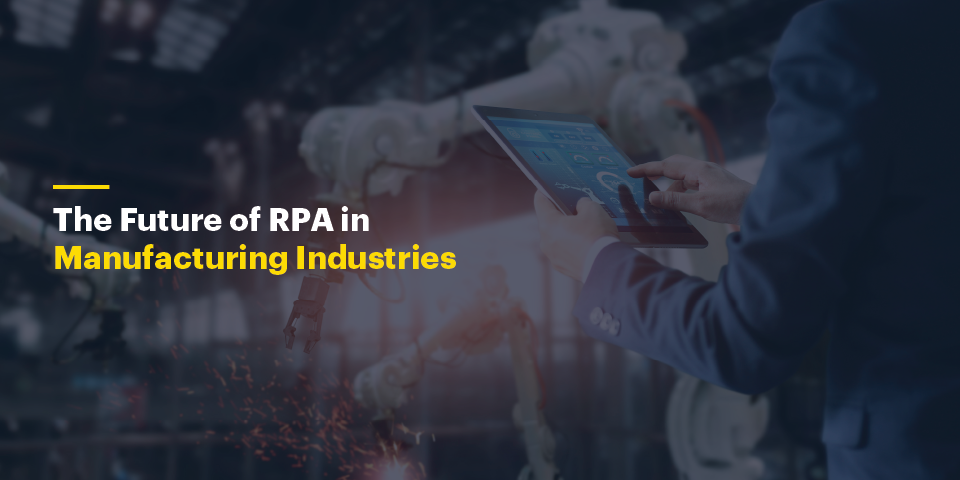The incredible balance of RPA and technology is advancing at an excellent pace. From connecting devices to integrating robots, ordering food online, to taking a driverless cab, machines are somehow taking over humans. It saves a lot of time and increases efficiency at the same time! Then why not? Here we are talking about Robotic Process Automation, commonly known as RPA. One such industry which is evolving like no other, and the credit goes to RPA, is the automation in the manufacturing industry.
Today, robotic-enabled machines are a common sight and often seen in almost all industries. Companies are gravitating towards investing in smarter robots to increase their production efficiency. According to the report released by Statista, the global Robotic Process Automation market is worth around $179 billion, which means there is a tremendous scope of growth and future rise.
Business Benefits of RPA in Manufacturing
Here are some of the business benefits of RPA in manufacturing –
A rule-based process automation up to 70% to 80%. RPA robots choose the rule-based, repetitive tasks which minimize the over human-interface. Here are some benefits of RPA in manufacturing –
- Deceased human labour and time spent on everyday tasks.
- Minimize the go-market hours.
- Minimize process errors and Increase data quality by reducing and even eliminating human interface.
- Maintaining an audit trail.
RPA Use Cases in Manufacturing
As bots came into existence, the interference of humans has been reduced to a larger degree. Today, RPA bots are capable of making wise decisions, especially when it comes to easy tasks. Manufacturing factories mostly have repetitive tasks which do not include complex strategy formation; hence bots eliminate human existence, therefore, leading to no errors. Here are some of the most important uses in manufacturing –
- Supply chain management
The RPA bots are capable of automating invoices by the following –- Extract the required data from the invoice using OCR.
- Comparing invoices with the purchase orders.
- Converting raw data into the structured form.
- Updating the invoices.
- Cross-check to eliminate duplicates.
Most small business owners are dependent on manual processes; therefore, they rely on paper or pdf based processes for tracking orders and items. RPA in manufacturing industries can easily automate repetitive functions while helping humans to manage complex tasks.
- Production – Bills of Materials (BOM)
Product structure, commonly known as the bill of material, is one important document that plays a significant role in the manufacturing industry. It has a list of sub-assemblies, raw materials, intermediate assemblies, parts, sub-components and quality of every component required in the manufacturing process. RPA bots, along with OCR, can help in extracting products and following human steps while avoiding errors. - Stock optimization
For any organization, inventory is its main asset, and its optimization is exceptionally crucial. Do you know the RPA bots are intelligent enough to take care of your inventory? Yes! Now, RPA bots can easily automate –- Placing orders
- Monitoring levels of inventory
- Generating receipts
- Replying to queries and quotations
- Tracking deliveries.
- Data management Recommendations
According to the data, nearly 37% of engineers’ time is spent collecting data manually. The introduction of RPA bots has made things easier. As they automate –- financial data and cleansing inventory
- Shifting data from old to the new system
- Structuring raw data
- Scheduling conversions and data imports.
- Updating the structured data in the ERP system.
- Management of data warehouses.
Recommendations to Business Leaders
Today, technology has taken the front seat, and in the manufacturing industry, automation can be a great benefit to improve the product, manage performance, mitigate risk factors, and avoid human errors. Some technologies which manufacturing industries can take into consideration are –
- Big data analytics
- Leverage artificial intelligence
- Embracing augmented and virtual reality.
Why Team Computers?
Having said that, it would not come as a surprise or even shock if you see RPA as the future of the manufacturing industry. Its integration with the manufacturing industry is going to be seamless. Team Computers is a leader in providing RPA services to meet your industry’s needs while driving end-to-end solutions. With over 34 years of experience and expertise across multiple verticals they have equipped themselves with certified solution architects and “Centre of Excellence” team to provide the best of experience to its clients. The manufacturing vertical is an age-old practice within Team.
Visit Team Computers for RPA services!
